1907 Detroit Tigers season
The 1907 Detroit Tigers won the American League pennant with a record of 92–58, but lost to the Chicago Cubs in the 1907 World Series, four games to none (with one tie). The season was their 7th since they entered the American League in 1901.
| 1907 Detroit Tigers | |
|---|---|
| 1907 American League Champions | |
| Major League affiliations | |
| |
| Location | |
| |
| Other information | |
| Owner(s) | William H. Yawkey |
| Manager(s) | Hughie Jennings |
| < Previous season Next season > | |
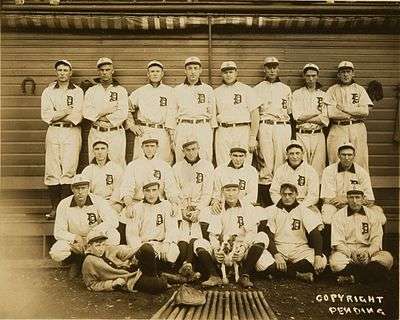
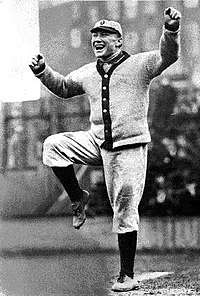
Offseason
In March 1907, Detroit manager Hughie Jennings actually offered Ty Cobb to the Cleveland Naps in exchange for Elmer Flick.[1] The Naps refused the deal.
Regular season
Season summary
The 1907 season was the first year the Tigers won the American League pennant. Their 1907 record of 92–58 was the team's best record to that point. Led by Ty Cobb, who led the American League in batting average (Cobb's first batting crown), RBIs, and slugging percentage, and Sam Crawford, who led the league in runs scored and extra base hits, they scored 89 more runs than any other team in the American League and outscored their opponents 694 to 532. They finished 1½ games ahead of the A's.
The 1907 Tigers' winning percentage ranks as the 9th best in team history, as follows:
| |||||||||||||||||||||||||||||||||||||||||||||||||||||||||||||||||||||||||
The players
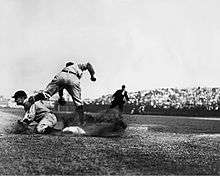
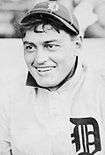
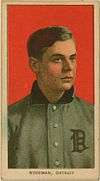
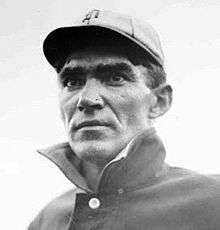
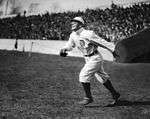
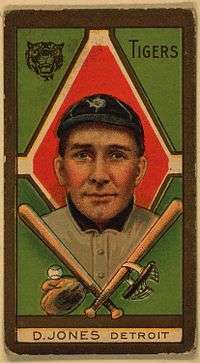
Catchers: Boss Schmidt and Fred Payne
Catching duties were split between Boss Schmidt (67 games), Fred Payne (46 games), and Jimmy Archer (17 games).
Schmidt hit .244 in 1907. As a young man, Schmidt worked in the coal mines and was a skilled brawler who fought an exhibition match with the heavyweight champion, Jack Johnson.[2] Schmidt also beat Ty Cobb in at least two fights.[2] In the second fight, Schmidt knocked Cobb unconscious but admired Cobb's resiliency, and the two became friends until Schmidt's death in 1932. Schmidt never wore shinguards and could force nails into the floor with his bare fists.[3]
Infield: Rossman, Downs, O'Leary, Coughlin, and Schaefer
First baseman Claude Rossman played for the Tigers from 1907 to 1909. In 1907, Rossman hit .277 and had 69 RBIs—third most on the team after Cobb and Crawford. Rossman had a peculiar emotional quirk where he sometimes froze and could not throw the ball when he became excited. Runners would lead off first to draw a throw from the pitcher, then run to second when Rossman froze.[4] He was 28 when he played his last major league game and died at age 46 in a New York hospital for the insane where he had been a patient for several years.
Red Downs and Germany Schaefer platooned at the second base position for the Tigers in 1907 and 1908. Downs hit .219 in 1907 with 42 RBIs and 28 runs scored. In March 1932, Downs and another man robbed a jewelry store at the Biltmore Hotel in Los Angeles. Downs was convicted of first-degree robbery and sentenced to five years to life. He was paroled after 3½ years and returned to Iowa.
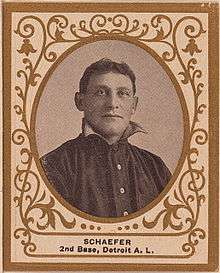
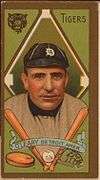
Germany Schaefer was a backup second baseman and utility infielder for the 1907 Tigers. He played 74 games at second base, 18 at shortstop, and 14 at third base. Schaefer is remembered more for his antics than for his performance on the field, including trying to steal first base (from second base) and, coming to bat in the rain with a raincoat and boots (to persuade the umpire to call the games). Schaefer was a pioneer of baseball clowning, and his vaudeville act with teammate Charley O'Leary was inspiration for the MGM musical film "Take Me Out To The Ball Game" starring Gene Kelly and Frank Sinatra.[5] In 1919, a little over a year after Schaefer played his last game, he died at age 42 of tuberculosis at the sanitarium in Saranac Lake, New York.
Charley O'Leary was Detroit's starting shortstop from 1904 to 1907. In 1907, he hit .241 and scored 61 runs. On September 30, 1934, O'Leary pinch hit for the St. Louis Browns at age 51 and became one of the oldest players to collect a hit and score a run.
Third baseman Bill Coughlin, known as "Scranton Bill", was named team captain in 1907 and 1908. He was a light-hitting defensive player, who never hit higher than .252 for the Tigers. His 232 putouts in 1901 is the 8th highest single season total in history by a major league third baseman. He is also one of the few MLB players to have stolen 2nd base, 3rd base and home in a single game. Coughlin was also the maestro of the hidden ball trick. Although no known comprehensive list is known to exist of all times when the hidden ball trick has worked, Coughlin reportedly pulled it off seven times (and at three different positions) – more than any other player in MLB history.[6] In Game 2 of the 1907 World Series, Coughlin caught Jimmy Slagle with a hidden ball trick, the only one in World Series history.[7]
Outfield: Cobb, Crawford and Jones
1907 was Ty Cobb's first season as an every-day starter. He won his first batting crown with a .350 average and led the American League in RBIs (119), slugging percentage (.468), hits (212), total bases (283), stolen bases (49), and runs created (106).
Right fielder Sam Crawford, known as "Wahoo Sam", was one of the greatest sluggers of the deadball era and still holds the major league records for triples in a career (309) and for inside-the-park home runs in a season (12) and a career (51). He finished his career with 2,961 hits and a .309 batting average. Crawford was among the AL leaders in hits, RBIs, extra base hits, slugging percentage, and total bases every year for twelve consecutive years from 1905 to 1915.[8] In 1907, Crawford finished second in the AL in batting average (.323) behind Cobb, and led the league in runs scored (102) and extra base hits.
Davy Jones played for the Tigers from 1906 to 1912. With Cobb and Crawford solidly entrenched in the outfield, Jones was forced to battle for the third outfield spot with Matty McIntyre each year from 1906 to 1910. As a speedy leadoff man, he was a reliable run scorer with Cobb and Crawford following him in the lineup. Jones' speed also made him a fine outfielder, with tremendous range In 1907, he finished second in the AL with 101 runs. In his three World Series for the Tigers, Jones played in 18 games, had a .357 on-base percentage, scored 8 runs, and had a home run in the 1909 World Series against the Pittsburgh Pirates.
Pitching: Mullin, Killian, Siever, and Donovan
"Wild Bill" Donovan was the Tigers ace in 1907 with a 25–4 record—the best win percentage in Tigers' team history. On May 7, 1906, Donovan stole second base, third base, and home on the front end of a double steal and also hit a triple in the same game.[9] In June 1923, Donovan died in a train wreck.[10]
Ed Killian led the team (and was 2nd in the AL) with a 1.78 ERA and compiled a 25–13 record. As of the end of the 2009 season, Killian's career ERA of 2.38 is the 26th-best in MLB history.[11] Killian also holds the record for fewest home runs allowed, giving up only 9 in his entire career. At one point, Killian pitched a record 1001 innings (from September 1903 – August 1907) without allowing a home run.[12]
George Mullin won 20 games in 1907, but he also lost 20 games. His ERA of 2.59 was the highest among the four Detroit starting pitchers. Mullin holds the Detroit Tigers franchise record for innings pitched (in a career and in a season) and has the second most wins in the team's history. He also pitched the team's first no-hitter; had five 20-win seasons (including a league-leading 29 wins in 1909; twice hit over .310 as a batter); and ranks 7th in major league history for fielding assists by a pitcher.
The fourth Tiger starter was Ed Siever who had a 2.16 ERA in 1907 with a record of 18–11. Siever's Adjusted ERA+ of 191 for the 1902 Tigers is the second-best (after Hal Newhouser) in Tigers franchise history for a pitcher with more than 150 innings pitched. (See Detroit Tigers award winners and league leaders) Ironically, Siever won fewer games in 1902 than he did any other full season he played.
Player/Manager Hughie Jennings
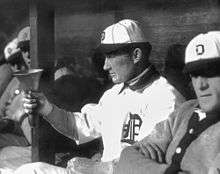
Hughie "Ee-yah" Jennings led the Tigers to three consecutive American League pennants, in 1907–08–09. Jennings continued to manage the Tigers through the 1920 season, though his team never won another pennant. During his years as Detroit's manager, Jennings became famous for his antics, mostly in the third base coaching box, which variously included shouts of "Ee-Yah", and other whoops, whistles, horns, gyrations, jigs, and grass-plucking. The "Ee-Yah" whoop became his trademark and was accompanied with waves of both arms over his head and a sharp raising of his right knee. In 1907, he was suspended for taunting opponents with a tin whistle.[13] The "Ee-Yah" shouts continued and became such a trademark that Jennings became known as Hughie "Ee-Yah" Jennings, and Detroit fans would shout "Ee-Yah" when Jennings would appear on the field.[14][15] (See also Jack Smile, Ee-yah: The Life And Times Of Hughie Jennings, Baseball Hall Of Famer)
Behind the antics was a great coaching mind. Connie Mack called Jennings one of the three greatest managers in history, along with John McGraw and Joe McCarthy.[15]
Season highlights
- September 27: The Tigers beat the A's, 5–4‚ to take over first place.
- September 30: The Tigers and A's, battling for the pennant, play to a 17-inning 9–9 tie in one of the most memorable games of the 1907 season. In the first game of a planned double header‚ the A's got off to a 7–1 lead against "Wild Bill" Donovan. The Tigers came back to tie the game, 8–8, against Rube Waddell, on a two-run home run by Ty Cobb. Both teams scored once in the 11th, and an umpire's ruling cost Philadelphia the game in the 14th inning. Harry Davis hit a long fly. Detroit outfielder Sam Crawford went to the crowd's edge‚ and a policeman stood up and moved‚ either to interfere or to get out of the way. Home plate umpire Silk O'Loughlin ruled there was no interference‚ then reversed his ruling when base umpire Tom Connolly offered a different opinion. The game was called because of darkness in the 17th‚ a 9–9 tie. The Tigers‚ in first place‚ left for Washington where they won four games.
- October 2: The Tigers swept a double header against Washington‚ winning 9–5 and 10–2. Ty Cobb got his 200th hit.
Season standings
| American League | W | L | Pct. | GB | Home | Road |
|---|---|---|---|---|---|---|
| Detroit Tigers | 92 | 58 | 0.613 | — | 50–27 | 42–31 |
| Philadelphia Athletics | 88 | 57 | 0.607 | 1½ | 50–20 | 38–37 |
| Chicago White Sox | 87 | 64 | 0.576 | 5½ | 48–29 | 39–35 |
| Cleveland Naps | 85 | 67 | 0.559 | 8 | 46–31 | 39–36 |
| New York Highlanders | 70 | 78 | 0.473 | 21 | 32–41 | 38–37 |
| St. Louis Browns | 69 | 83 | 0.454 | 24 | 36–40 | 33–43 |
| Boston Americans | 59 | 90 | 0.396 | 32½ | 34–41 | 25–49 |
| Washington Senators | 49 | 102 | 0.325 | 43½ | 26–48 | 23–54 |
Record vs. opponents
1907 American League Records Sources: | |||||||||||||
|---|---|---|---|---|---|---|---|---|---|---|---|---|---|
| Team | BOS | CWS | CLE | DET | NY | PHI | STL | WSH | |||||
| Boston | — | 10–11–3 | 8–13 | 6–16 | 8–12–1 | 8–14–2 | 10–12 | 9–12 | |||||
| Chicago | 11–10–3 | — | 10–11–1 | 13–9–1 | 12–10 | 10–12–1 | 16–6 | 15–6 | |||||
| Cleveland | 13–8 | 11–10–1 | — | 11–11–1 | 15–7 | 8–14 | 12–10–2 | 15–7–2 | |||||
| Detroit | 16–6 | 9–13–1 | 11–11–1 | — | 13–8 | 11–8–1 | 14–8 | 18–4 | |||||
| New York | 12–8–1 | 10–12 | 7–15 | 8–13 | — | 10–9–1 | 8–14–1 | 15–7–1 | |||||
| Philadelphia | 14–8–2 | 12–10–1 | 14–8 | 8–11–1 | 9–10–1 | — | 14–6 | 17–4 | |||||
| St. Louis | 12–10 | 6–16 | 10–12–2 | 8–14 | 14–8–1 | 6–14 | — | 13–9 | |||||
| Washington | 12–9 | 6–15 | 7–15–2 | 4–18 | 7–15–1 | 4–17 | 9–13 | — | |||||
Roster
| 1907 Detroit Tigers | |||||||||
|---|---|---|---|---|---|---|---|---|---|
| Roster | |||||||||
| Pitchers | Catchers
Infielders |
Outfielders | Manager | ||||||
Player stats
Batting
Starters by position
Note: Pos = Position; G = Games played; AB = At bats; H = Hits; Avg. = Batting average; HR = Home runs; RBI = Runs batted in
| Pos | Player | G | AB | H | Avg. | HR | RBI |
|---|---|---|---|---|---|---|---|
| C | Boss Schmidt | 104 | 349 | 85 | .244 | 0 | 23 |
| 1B | Claude Rossman | 153 | 571 | 158 | .277 | 0 | 69 |
| 2B | Red Downs | 105 | 374 | 82 | .219 | 1 | 42 |
| 3B | Bill Coughlin | 134 | 519 | 126 | .243 | 0 | 46 |
| SS | Charley O'Leary | 139 | 465 | 112 | .241 | 0 | 34 |
| OF | Ty Cobb | 150 | 605 | 212 | .350 | 5 | 119 |
| OF | Sam Crawford | 144 | 582 | 188 | .323 | 4 | 81 |
| OF | Davy Jones | 126 | 491 | 134 | .273 | 0 | 34 |
Other batters
Note: G = Games played; AB = At bats; H = Hits; Avg. = Batting average; HR = Home runs; RBI = Runs batted in
| Player | G | AB | H | Avg. | HR | RBI |
|---|---|---|---|---|---|---|
| Germany Schaefer | 109 | 372 | 96 | .258 | 1 | 32 |
| Fred Payne | 53 | 169 | 28 | .166 | 0 | 14 |
| Matty McIntyre | 20 | 81 | 23 | .284 | 0 | 9 |
| Jimmy Archer | 18 | 42 | 5 | .119 | 0 | 0 |
| Bobby Lowe | 17 | 37 | 9 | .243 | 0 | 5 |
| Tex Erwin | 4 | 5 | 1 | .200 | 0 | 1 |
| Hughie Jennings | 1 | 4 | 1 | .250 | 0 | 0 |
| Red Killefer | 1 | 4 | 0 | .000 | 0 | 0 |
Note: pitchers' batting statistics not included
Pitching
Starting pitchers
Note: G = Games pitched; IP = Innings pitched; W = Wins; L = Losses; ERA = Earned run average; SO = Strikeouts
| Player | G | IP | W | L | ERA | SO |
|---|---|---|---|---|---|---|
| George Mullin | 46 | 357.1 | 20 | 20 | 2.59 | 146 |
| Ed Killian | 41 | 314 | 25 | 13 | 1.78 | 96 |
| Ed Siever | 39 | 274.2 | 18 | 11 | 2.16 | 88 |
| Bill Donovan | 32 | 271 | 25 | 4 | 2.19 | 123 |
| Herm Malloy | 1 | 8 | 0 | 1 | 5.63 | 6 |
Other pitchers
Note: G = Games pitched; IP = Innings pitched; W = Wins; L = Losses; ERA = Earned run average; SO = Strikeouts
| Player | G | IP | W | L | ERA | SO |
|---|---|---|---|---|---|---|
| John Eubank | 15 | 81 | 3 | 3 | 2.67 | 17 |
| Ed Willett | 10 | 48.2 | 1 | 5 | 3.70 | 27 |
| Elijah Jones | 4 | 16 | 0 | 1 | 5.06 | 9 |
Awards and honors
Players ranking among top 100 all time at position
The following members of the 1909 Detroit Tigers are among the Top 100 of all time at their position, as ranked by The New Bill James Historical Baseball Abstract in 2001:
- Ty Cobb: 2nd best center fielder of all time
- Sam Crawford: 10th best right fielder of all time
World Series
World Series summary
In the 1907 World Series, the Chicago Cubs beat the Tigers 4 games to none (with one tie). With pitching dominance over the Tigers and Cobb, the Cubs allowed only three runs in the four games they won, while stealing 18 bases off the rattled Tigers.
In Game 1, Tigers pitcher Bill Donovan struck out twelve Cubs in 12 innings. The Tigers scored three runs, in part due to three Chicago errors, in the 8th inning and held a 3–1 lead going into the bottom of the 9th. The Cubs loaded the bases on a single, walk and infield error with one out. Detroit conceded a run on a ground ball for the second out and Cub player-manager Frank Chance then used pinch-hitter Del Howard to bat for Joe Tinker. Howard struck out against "Wild" Bill Donovan (25–4 in the regular season) but the ball got away from catcher Boss Schmidt, allowing Harry Steinfeldt to score the tying run. Donovan got the next batter but the damage to Detroit has been done. The teams then played three scoreless innings before the game was called on account of darkness and declared a tie, a first for the World Series.
In Game 2, George Mullin, a 20-game winner and loser for Detroit in 1907 and who had walked over 100 batters in each of his last five seasons, issues a bases-loaded walk in the 2nd inning to tie the game at 1–1. Chicago scored two more in the 4th on a single, sacrifice bunt, RBI single, stolen base and double to take a 3–1 lead.
In Game 3, Cubs pitcher Ed Reulbach scattered six hits as Chicago jumped on Tiger starter Ed Siever for four runs on seven hits in only four innings. Johnny Evers had three hits, including two doubles, as the Cubs took a 2–0 lead in the series.
In Game 4, Detroit held a 1–0 lead on a triple by Ty Cobb and an RBI single by Claude Rossman before a rain delay in the 5th inning. When play resumed, Chicago baserunners reached via an error and a walk. After Joe Tinker sacrificed, pitcher Orval Overall drove both runners home on a single to right field. The Cubs scored three more in the 7th without hitting the ball out of the infield on four bunts (two for hits) and two ground balls.
In Game 5, Chicago wrapped up the series with a 2–0 victory as Mordecai Brown pitched a seven-hit shutout. The Cubs scored a run in the first inning on a walk, stolen base and RBI single by Harry Steinfeldt and scored again in the 2nd on an error, a single, a double-steal and a ground ball out to drive in the final run. Detroit had runners on 2nd and 3rd with one out in the 4th inning, but could not score and never seriously threatened after that.
Postseason player stats
Batting
Note: G = Games played; AB = At Bats; H = Hits; Avg. = Batting Average; HR = Home runs; RBI = Runs batted in
| Player | G | AB | H | Avg. | HR | RBI |
|---|---|---|---|---|---|---|
| Ty Cobb | 5 | 20 | 4 | .200 | 0 | 0 |
| Bill Coughlin | 5 | 20 | 5 | .250 | 0 | 0 |
| Sam Crawford | 5 | 21 | 5 | .238 | 0 | 3 |
| Davy Jones | 5 | 17 | 6 | .353 | 0 | 0 |
| Charley O'Leary | 5 | 17 | 1 | .059 | 0 | 0 |
| Claude Rossman | 5 | 19 | 9 | .474 | 0 | 2 |
| Germany Schaefer | 5 | 21 | 3 | .143 | 0 | 0 |
| Boss Schmidt | 4 | 12 | 2 | .167 | 0 | 0 |
Pitching
Note: G = Games pitched; IP = Innings pitched; W = Wins; L = Losses; ERA = Earned run average; SO = Strikeouts
| Player | G | IP | W | L | ERA | SO |
|---|---|---|---|---|---|---|
| Bill Donovan | 2 | 21 | 0 | 1 | 1.71 | 16 |
| George Mullin | 2 | 17 | 0 | 2 | 2.12 | 8 |
| Ed Killian | 1 | 4 | 0 | 0 | 2.25 | 1 |
| Ed Siever | 1 | 4 | 0 | 1 | 4.50 | 1 |
Notes
- Crazy '08: How a cast of Cranks, Rogues, Boneheads and Magnates created the Greatest Year in Baseball History, p. 164, by Cait Murphy, Smithsonian Books, a Division of Harper Collins, 2007, ISBN 978-0-06-088937-1
- "Boss Schmidt page at Baseball Library". Archived from the original on December 25, 2014. Retrieved August 27, 2012.
- Legends of the Game – Charles Schmidt
- Claude Rossman page at Baseball Library Archived September 30, 2007, at the Wayback Machine
- http://www.libs.uga.edu/russell/online-exhibits/baseball/popculture.html Archived September 5, 2007, at the Wayback Machine
- BBTF's Dialed In Discussion :: August 18, 2005
- Bill Coughlin page at Baseball Library Archived November 3, 2007, at the Wayback Machine
- Sam Crawford page at Baseball Reference
- Wild Bill Donovan page at Baseball Library Archived September 30, 2007, at the Wayback Machine
- Wild Bill Donovan Obituary at The Deadball Era Archived July 19, 2008, at the Wayback Machine
- Career ERA leaders at Baseball Reference
- Ed Killian page at Baseball Library Archived September 30, 2007, at the Wayback Machine
- CAM Cornelliana
- Hughie Jennings Obituary from Deadball Era Archived July 19, 2008, at the Wayback Machine
- "Archived copy". Archived from the original on January 2, 2013. Retrieved November 9, 2007.CS1 maint: archived copy as title (link)